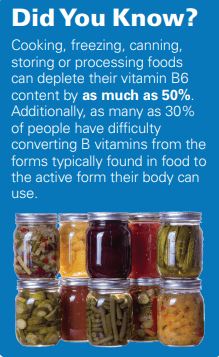• Help you feel clear headed and energetic
• Strengthen your heart and arteries
• Help prevent stroke
• Speed exercise recovery
• Reduce migraines
• Prevent or treat symptoms of depression
If you think that you’re getting enough magnesium from food sources alone, you may be mistaken. Magnesium has been depleted in the soil and is often stripped from foods during processing, so it’s not as prevalent in the diet as once thought. In fact, some experts estimate that up to 80 percent of the U.S. population is deficient. And that’s an alarming thought because magnesium supports a strong mind and body in virtually every way.
Promotes Calm, Alleviates Stress and Depression
Because magnesium is so closely tied to how our minds and bodies function, deficiencies can make you more susceptible to depression, and stop you from dealing with stress in a healthy way. The resulting tension can send your adrenal and pituitary glands into overdrive, and crank up cortisol and insulin levels. You end up feeling exhausted, less able to cope, and set yourself up for insulin resistance and high blood pressure, too.
Stress and magnesium deficiency can be a vicious cycle—stress can lead to magnesium depletion and the magnesium depletion then leads to greater stress levels and risk of depression. But on a positive note, some case histories have shown that magnesium supplementation—including a glycinate form, which is the kind I prefer—can speed recovery from depression symptoms in as little as seven days.

Magnesium also appears to help children who have trouble calming down and staying focused. While there are still more clinical trials needed to determine exactly how magnesium works for this, case histories support its use. And magnesium seems to have similar effects for adults.
Additionally, clinical studies have found that for children and adults, including women who suffer from menstrual migraines, preventative supplementation with magnesium significantly reduced the incidence of headaches. It is estimated that half of all migraine sufferers are magnesium deficient.
An Essential for Your Heart
If you want to keep your heart healthy and strong, you need magnesium. A study of over 9,000 participants in the Netherlands found a link between low magnesium levels, coronary heart disease risk, and cases of sudden cardiac death. They found that without enough magnesium, arteries thickened and the tone and overall health of blood vessels declined. A Finnish study reported that low magnesium is, on its own, a risk factor for heart failure in men—aside from lifestyle, blood pressure, and weight.
The good news is that it’s never too late to start supplementing with magnesium. A randomized, double-blind, placebo-controlled clinical study published in the American Journal of Clinical Nutrition showed that after just six months of supplemental magnesium, older adults who were overweight or obese had healthier arteries. Ultimately, that means better blood pressure and less strain on the heart.
Helps You Exercise Better, Recover Faster, & Relieves Cramps
Magnesium enhances physical performance. A clinical survey in Portugal found that magnesium helped elite basketball, handball and volleyball players score big in strength and movement tests, including trunk flexibility, rotation, and jumping. Magnesium relieves post-exercise pain, too, so it’s a great nutrient to have on board either before or immediately following a workout or if you have a physically demanding job.
Women who are pregnant may experience painful cramping in their legs that can’t be treated with conventional, over-the-counter medications. Fortunately, a double-blind, placebo-controlled clinical trial found that 300 mg per day of chelated magnesium— a form that is easy on the stomach for four weeks significantly reduced the frequency and intensity of leg cramps.
Another clinical trial found that magnesium also relieved premenstrual symptoms when it was paired with vitamin B6.
Partner Nutrients for Magnesium
Get Active Vitamin B6 as P-5-P
For magnesium, one of the best partner nutrients is vitamin B6. Vitamin B6 helps magnesium absorb better and is often recommended as a second nutrient to relieve muscle cramps, stress, and other conditions.
But not just any vitamin B6 will do. Common forms need to be converted by the liver into pyridoxal-5-phosphate (P-5-P) before they can do much good. That’s why starting with P-5-P as your supplemental form is best.
For example, vitamin B6 has been recommended for carpal tunnel and other nerve and muscle ailments for some time. And although the results with standard forms of vitamin B6 can be positive, there is a possibility of actually creating the very symptoms of nerve and muscle conditions that you’re trying to treat and prevent when using high dosages.
That’s because pyridoxine—the inactive form of vitamin B6 found most often in mass-market supplements—can actually block the body’s ability to use active P-5-P. A recent Dutch laboratory study found that pyridoxine induces neuropathy symptoms by inhibiting P-5-P dependent enzymes, essentially competing with the active form of vitamin B6. Surplus doses of pyridoxine, over time, paradoxically causes the same conditions as having a deficiency of B6.
And that’s just one reason for starting with supplemental vitamin B6 as P-5-P. Other work has shown that individual blood levels of the nutrient can determine risk of inflammation, heart conditions, blood sugar levels, and of course, carpal tunnel syndrome. Plus, inflammation alone can deplete vitamin B6 levels causing more damage and pain. Patients with rheumatoid arthritis have been found to have lower levels compared to healthy individuals. Robust P-5-P levels may protect the brain and cognitive abilities as people age. Clinical work has found that lower P-5-P levels were associated with a 3.5 times higher risk of accelerated mental decline. Additionally, low P-5-P levels have been shown to increase the risk of stroke four-fold, or up to 400 percent.
I have also recommended P-5-P to people dealing with nerve pain, burning feet (diabetic neuropathy), carpal tunnel syndrome, PMS, or water retention. The results have been outstanding.
Zinc—A Must-Have Mineral
Zinc is another mineral that works well with magnesium and P-5-P. It helps heal muscle and tendon damage, may prevent depression, and keeps the immune system strong.
If you’re deficient in zinc, your glutathione levels are probably low, too. Glutathione is produced by the body and has been called “the master antioxidant.” It helps the body create white blood cells (supported directly by zinc as well) that fight harmful infections and viruses, enhances the liver’s ability to detoxify, and prevents oxidative damage to brain and nerve cells.
Zinc deficiency, like that of magnesium, has also been linked to depression and anxiety disorders. But the mineral only has potential if is properly absorbed. I recommend a glycinate chelate form for the best absorption and utilization.
Magnesium for Every Reason
It can be easy to become complacent about basic nutrients. You may think that your diet has you covered. Unfortunately, deficiencies of magnesium are common enough because of the prevalence of refined foods in the diet and the lower nutritional profile of vegetables and fruits grown in mineral depleted soils. So, even if you’re eating well you still could have a lack of magnesium – especially if you’re active.
It is hard for me to think of any health concern that would NOT benefit from bioactive and readily utilized magnesium, P-5-P, and zinc. By incorporating all three into your regimen every day, you can make a profound improvement in your health.
